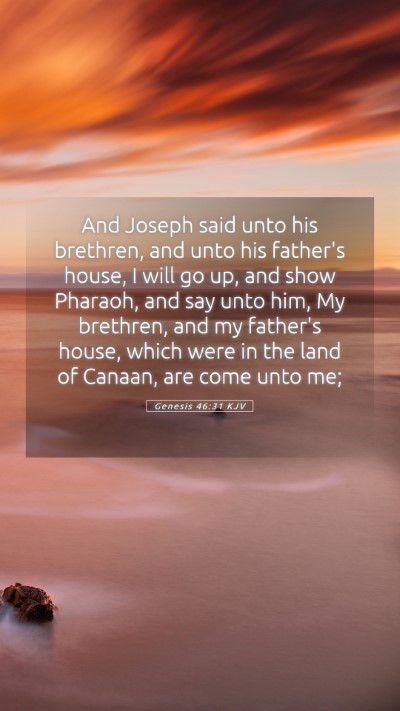Understanding Genesis 46:31
Genesis 46:31 states: "And Joseph said unto his brethren, and unto his father's house, I will go up, and show Pharaoh, and say unto him, My brethren, and my father's house, which were in the land of Canaan, are come unto me."
Bible Verse Explanations
This verse serves as a crucial point in the narrative of Joseph's reunion with his family in Egypt. Joseph, having risen to power in Egypt, is preparing to introduce his family to Pharaoh, positioning them in a way that acknowledges their heritage while also highlighting Joseph's authority and new life in Egypt.
Bible Verse Meanings
- Family Reunification: One of the primary themes in this verse is the importance of family. After years of separation, Joseph’s desire to show his family to Pharaoh indicates the significance of familial bonds.
- Faith and Providence: This moment in Scripture emphasizes the divine plan at work. Joseph credits God for his position and reunion, illustrating how God orchestrates events for a greater purpose.
Bible Verse Interpretations
According to Matthew Henry, Joseph demonstrates both humility and authority. By informing Pharaoh about his family, he acknowledges his roots while also respecting the authority of the Egyptian ruler. Joseph’s actions embody how believers should honor both God and the structures of authority in their lives.
Albert Barnes notes that Joseph’s initiative signifies a strategic yet respectful approach. He seeks to invite his family into the higher purpose God has placed in his life, ultimately for their welfare as well as his. This reflects how believers can balance personal success with the needs of their loved ones.
Adam Clarke emphasizes the emotional gravity of this moment. Joseph's past of betrayal and hardship contrasts sharply with his current position, highlighting themes of forgiveness and the restoration of relationships, crucial for Bible study insights.
Scripture Analysis
This verse can be seen as not just a historical account but also as a practical guide for today’s believers. It prompts reflection on how we introduce our backgrounds and relationships to others, especially in new environments. Joseph's approach serves as a model for how to engage with authority respectfully while remaining true to one's identity.
Historical Context of Bible Verses
Understanding Genesis 46:31 requires an appreciation of the broader cultural and historical setting of the time. Joseph, a Hebrew, stands in a position of power in a foreign land. His willingness to publicly acknowledge his family reflects cultural practices of the period, where lineage and family lineage played significant roles in identity and acceptance.
Additional Bible Study Insights
For those engaged in Bible study groups or online Bible study, this verse provides rich material for discussion. It can lead to explorations of themes like:
- The significance of forgiveness and reconciliation in familial relationships.
- The interplay of faith and authority in the lives of believers.
- How God’s providence shapes personal destinies and familial legacies.
Applying Bible Verses to Daily Life
Those searching for how to interpret Bible verses can look to Genesis 46:31 as an application of trust in God. By introducing his family to Pharaoh, Joseph not only honors his heritage but also shows a commitment to God’s plan for his life and the lives of his family members.
Cross References
This verse relates closely to the following passages:
- Genesis 37:28 - The backstory of Joseph's brothers selling him into slavery.
- Genesis 45:4-5 - Joseph reveals himself to his brothers and speaks of God's plan.
- Genesis 47:1-6 - The actual interaction between Joseph and Pharaoh regarding his family’s arrival.
Conclusion
In summary, Genesis 46:31 invites readers to delve into deeper Bible verse meanings and understanding, encouraging personal reflection on relationships, authority, and divine providence. For those desiring more insights, this passage can serve as a springboard into extensive Bible study lessons, promoting rich discussions in Bible study groups.


